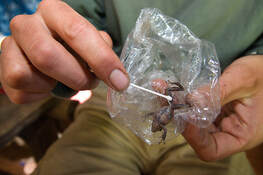
 The lab has been awarded an NSF grant, part of the collaborative proposal "Linking Host Life History, Movement Ecology, and Climate to Predict Epizootics in Megadiverse Tropical Amphibian Communities", with collaborators Gui Becker (University of Alabama) and Rayna Bell (California Academy of Sciences). Field sites include frog communities in Brazil, Peru, and Cameroon The funded collaborative project will include 1) field surveys spanning the old world and new world tropics to assess infection patterns in diverse amphibian communities across space and time, 2) a field experiment to isolate the effects of climatic variability on amphibian community structure and disease risk, and 3) novel methods of disease modelling that integrate observational and experimental data to forecast disease dynamics and population demographics at the community scale. A cornerstone of this integrative approach is to examine the disease dynamics of fully terrestrial amphibians. This guild of tropical frogs has been experiencing cryptic population declines and extinctions ostensibly linked to disease, droughts, shifts in host behavior, spatial aggregation, and pathogen spillover. The field survey component will compare spatiotemporal disease dynamics among co-occurring terrestrial-breeding and aquatic-breeding amphibian species, focusing on divergent host movement patterns and responses to climatic variability.
0 Comments
|
Archives
June 2024
CATENAZZI LABNews from the lab Categories |
 RSS Feed
RSS Feed